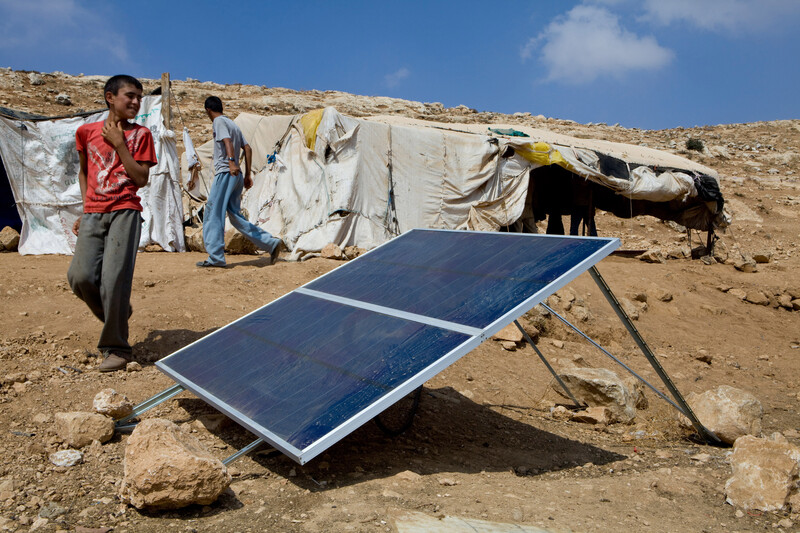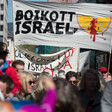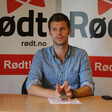Rights and Accountability 6 May 2017

A solar panel in Susiya, a village in the South Hebron Hills of the West Bank, was installed as part of a Comet-ME project, 16 of which are threatened with demolition.
ActiveStillsWith an abundance of sunlight, Palestinians should be in prime position to take advantage of global advances in alternative energy technology.
Instead, however, solar power has become another area of segregation, with Israel building solar fields in occupied Palestinian territory in violation of international law and for the benefit of Israeli settlers.
A recent report by the research center Who Profits details how international corporations are complicit in this discriminatory solar power policy.
The study also notes how Palestinians, in trying to implement their own small-scale solar projects, often face threats of demolition.
“We’ve been here since 1948,” says Ali Mohamed Hraizat, quoted in the report. The head of the Palestinian village council of Imneizil, his community is not connected to the Israeli electrical grid and a demolition order has been issued against its solar panels: “We try to stay and maintain our lives, but people will leave if the electricity is cut off.”
Greenwashing
At the forum of the global initiative Sustainable Energy for All launched by UN Secretary-General Ban Ki-moon, Israel’s UN ambassador Ron Prosor declared in May 2015 that “to realize that the same sun that shines equally on all of us, is owned by none of us, and can supply energy in abundance, inherently promotes peace.”
Such comments exemplify attempts to portray Israel as an environmental champion despite the discriminatory manner in which green energy is being implemented. It is known as “greenwashing” by Palestine solidarity campaigners.
Who Profits notes that 25 percent of the current Palestinian demand for energy could be met by using presently available sources such as solar, biomass and wind energy. But the Israeli barriers to movement and contiguous infrastructure needed to produce, store and supply energy make Palestinian energy independence virtually impossible.
The situation is particularly dire in Gaza, where the bombing of its sole power plant in Israeli military offensives and dependence on Israel for fuel has led to power cuts of anywhere from eight to 20 hours on a daily basis.
Electric apartheid
Since October 2014, the Israeli government has promoted solar power in West Bank settlements through state subsidies for commercial solar fields and home-based solar systems. These renewable sources supplement the connection Israeli settlements already have to the conventional power grid.
Electricity in both Israel and the West Bank is supplied by a state-controlled monopoly, the Israel Electric Corporation. When the company was first officially registered during the British Mandate in 1923, it was called the Palestine Electric Corporation. The name was not changed until 1961.
Four commercial solar fields have been built in the West Bank so far. All supply power to the Israel Electric Corporation, which buys solar-generated power at four times the price of non-renewable sources. Settlers who install individual residential systems in their homes have the additional incentive that any surplus energy created can be sold back to the company.
There are no such incentives for Palestinians, who are denied both access to the Israeli grid and permission to build new structures.
For example, in November 2015, the Meitarim Solar Field was built next to the Palestinian village Khirbet Zanuta. Khirbet Zanuta is denied access to any electricity (as well as water, sewage, or telecommunications) network.
Located near the boundary between Israel and the occupied West Bank, the village is hemmed in by Israel’s wall, settler bypass roads, three settlements and an Israeli settlement industrial zone. Settlement expansion has taken some 200,000 square meters of village land, while no building permits have been issued to Khirbet Zanuta residents.
In 2007, Israeli authorities issued demolition orders against most of the structures in Khirbet Zanuta. Its residents have been fighting legal battles to resist the complete destruction of their village ever since.
Even when international organizations assist Palestinians in overcoming the many obstacles to installing solar technology, the resulting projects are often threatened with demolition.
Who Profits cites the example of Comet-ME, an organization that has built 30 solar energy systems in the West Bank. Israeli authorities are threatening 16 of those projects with demolition.
Power plays
As the Khirbet Zanuta example shows, Israeli authorities have used solar power as one more element of an electrical infrastructure used to control Palestinian society.
In the West Bank, Palestinian electrical companies function as sub-distributors and bill collectors for the Israel Electric Corporation. Palestinians in the West Bank and Gaza Strip consume the lowest amount of energy in the region while paying the highest prices. Who Profits reports that, with an average price of about $0.18 per kilowatt-hour from 2010 to 2013, the price of electricity for Palestinians in the West Bank was 12 times higher than the average price in Israel.
These high prices, demanded from a Palestinian economy withered by decades of occupation, have created a debt crisis in which Israeli authorities use the electricity bill owed to the Israel Electric Corporation as a political weapon. According to the Israel Electric Corporation, the debt owed by the Palestinian Authority amounted to approximately $530 million in 2016.
Last year, the Israel Electric Corporation cut power for specified periods of time to West Bank cities, calling it an official warning to the Palestinian Authority to pay its bills. Such practices amount to collective punishment, a violation of international law under the Fourth Geneva Convention and Hague Regulations, Who Profits states.
Who Profits specializes in investigating corporate complicity in the Israeli settler-colonial enterprise. In producing the report, the authors contacted each of the dozen companies who either produced the solar panels or participated in construction of the commercial fields. They informed the companies, which included Israeli, US, German, Italian and Chinese firms, that their products and services were being used in breach of international law.
Clean energy, dirty truth
Only two companies responded, taking a familiar line used by many corporations engaged in the settler-colonial economy. PADCON, a German company, claimed that it “regularly supplies electrical equipment to construction companies in Israel that build photovoltaic projects,” and that they “don’t know nor require to ask where this equipment was installed by the Israeli companies.”
Caterpillar, long targeted by human rights campaigners for the use of its machinery in the demolition of Palestinian homes, had frequently made a similar defense that it has “neither the legal right nor the means to police individual use of the equipment” they sell to the Israeli military.
However, in addition to providing solar technology and logistical support, Israeli companies Clal Sun, Energix, and the Company for the Development of Mount Hebron participated directly in the very construction of commercial solar fields on occupied land, making their complicity that much more indefensible.
In 2012, Israel launched an international campaign to brand itself as a pioneer of green technology.
But as long as Israel’s solar energy initiatives remain as segregated as the rest of its settler-colonial enterprise, such clean energy efforts will always be polluted by its apartheid policies.




